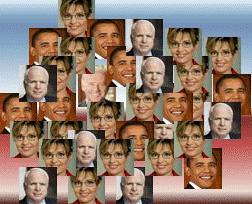Friday evening I went to a debate party. To be fair, I should clarify immediately that it was an Obama debate party, one I found out about on the Obama official website. Laughter, sarcastic remarks, and cheers were heard throughout the crowded living room, and they were of course, one-sided. However, when the TV was off, the discussion began, and someone actually said, “Thank God for You Tube.” She was referring to Obama’s reference to McCain’s bomb Iran song. I personally had never heard of the song, but in one click the next day, I was informed. You Tube has changed this campaign greatly. What one politician hopes to have slide away into the abyss of the forgettable is accessible to all. Anyone watching the debate and unfamiliar with the reference knows where to go and how to watch it for free. Not only that, but he or she can email the link to an entire address book. Like a virus or an inappropriate joke, the electronic message will speedily find its way to many computer screens. These clips and moments from past speeches will last longer than the words from the debate and will still be floating around even after the political bumper stickers peel from the cars.
Another handy You Tube phenomenon is the wave of clips splicing together the words of one candidate who contradicts himself across many speeches. The people putting together these videos have the privilege over journalists of possessing an unabashed agenda. They don’t play fair or walk on eggshells around the issue. They put it together, broadcast it, and make the viewer feel special or prized for being granted a peek at something deeper than the mass media would provide. At the end of many of these videos, the screen encourages the viewer to spread the word, as if it were gospel that needed to be communicated for the greater good. One such video was sent to me.
Of course, the video implies that media does not show the viewer such startling and important truths; however, journalists are shown in the clips as having caught him in changing his words and contradicting his quotes. True, reporters will not put the collage of untruths together in one entertaining format. The video is much easier to locate and spread than several mass media articles and shows. Thank God for You Tube.



Recent Comments